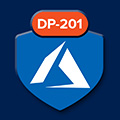
Duration: 2 Days
 Candidates for this exam are Azure data engineers who are responsible for data related tasks that include ingesting, egressing, and transforming data from multiple sources using various services and tools. The Azure data engineer collaborates with business stakeholders to identify and meet data requirements while designing and implementing the management, monitoring, security, and privacy of data using the full stack of Azure services to satisfy business needs.
Why you need to attend this course?
Candidates for this exam are Azure data engineers who are responsible for data related tasks that include ingesting, egressing, and transforming data from multiple sources using various services and tools. The Azure data engineer collaborates with business stakeholders to identify and meet data requirements while designing and implementing the management, monitoring, security, and privacy of data using the full stack of Azure services to satisfy business needs.
Why you need to attend this course?
Module 1: Data Platform Architecture Considerations
In this module, the students will learn how to design and build secure, scalable and performant solutions in Azure by examining the core principles found in every good architecture. They will learn how using key principles throughout your architecture regardless of technology choice, can help you design, build, and continuously improve your architecture for an organizations benefit.
Lessons:
Hands-On: Case Study
Module 2: Azure Batch Processing Reference Architectures
In this module, the student will learn the reference design and architecture patterns for dealing with the batch processing of data. The student will be exposed to dealing with the movement of data from on-premises systems into a cloud data warehouse and how it can be automated. The student will also be exposed to an AI architecture and how the data platform can integrate with an AI solution.
Lessons:
Hands-On: Architect an Enterprise-grade Conversational Bot in Azure
Module 3: Azure Real-Time Reference Architectures
In this module, the student will learn the reference design and architecture patterns for dealing with streaming data. They will learn how streaming data can be ingested by Event Hubs and Stream Analytics to deliver real-time analysis of data. They will also explore a data science architecture the streams data into Azure Databricks to perform trend analysis. They will finally learn how an Internet of Things (IoT) architecture will require data platform technologies to store data.
Lessons:
Hands-On: Azure Real-Time Reference Architectures
Module 4: Data Platform Security Design Considerations
In this module, the student will learn how to incorporate security into an architecture design and learn the key decision points in Azure provides to help you create a secure environment through all the layers of your architecture.
Lessons:
Hands-On: Data Platform Security Design Considerations
Module 5: Designing for Resiliency and Scale
In this module, student will learn scaling services to handle load. They will learn how identifying network bottlenecks and optimizing your storage performance are important to ensure your users have the best experience. They will also learn how to handle infrastructure and service failure, recover from the loss of data, and recover from a disaster by designing availability and recoverability into your architecture.
Lessons:
Hands-On: Designing for Resiliency and Scale
Module 6: Design for Efficiency and Operations
In this module, students will learn how to design an Azure architecture that is operationally-efficient and minimizes costs by reducing spend, they will understand how to design architectures that eliminates waste and gives them full visibility into what is being utilized in your organizations Azure environment.
Lessons:
Hands-On: Design for Efficiency and Operations
The trainer will be Microsoft Azure Professional.
£999+VAT
Clientele ➞























Our Partners




